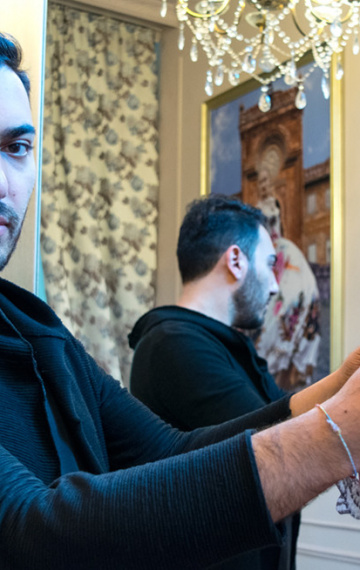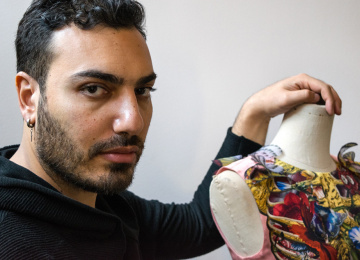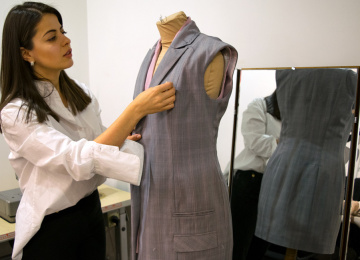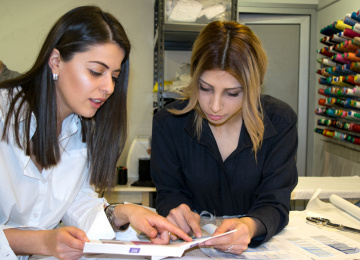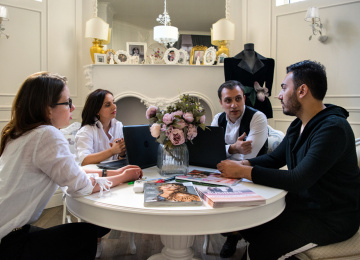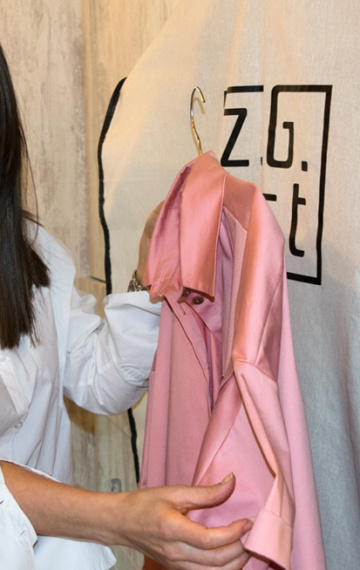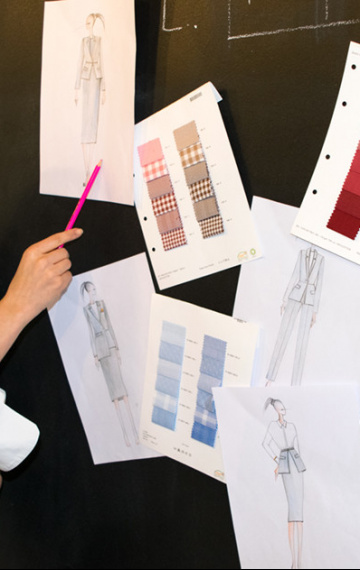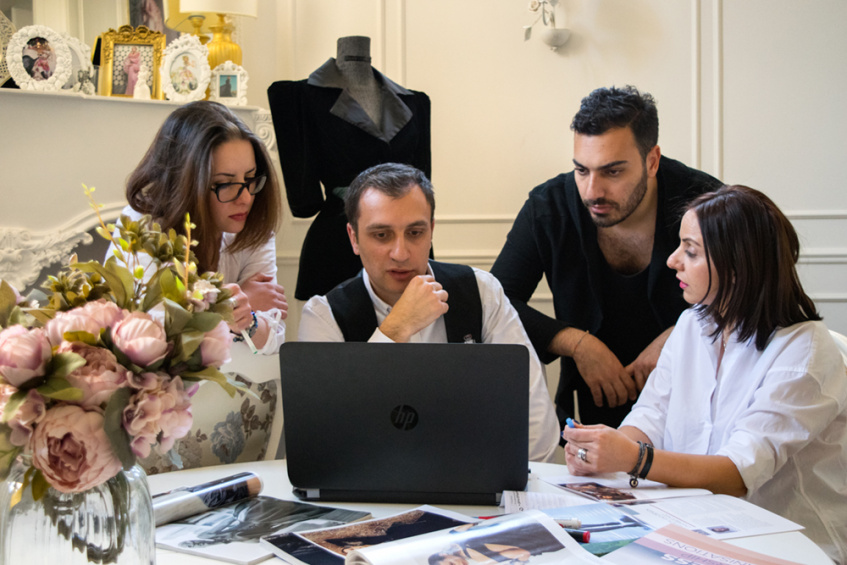
Armenia is well known for its unique cultural and creative heritage. In music, film, poetry and painting, Armenia has nurtured artists known the world over, and seen its creative potential flourish. Now, Armenian fashion designers have a chance to highlight their creative flair, thanks to the ‘Support to SME Development in Armenia’ (SMEDA) project, co-funded by the European Union in the framework of the EU4Business initiative and the German Federal Ministry for Economic Cooperation and Development, and implemented by GIZ.
Creative industries in Armenia have the potential to become the next big investment sector in the country. And fashion is one of the most promising directions. When the ‘Business Club for Impact’ joined up with the ‘Fashion and Design Chamber’ to establish the Business Club for Fashion and Design with EU support in February 2018, it united individual designers for the first time to create a joint platform for the fashion and design industry, bringing more knowledge and business skills to the world of design.
Vahan Khachatryan, a designer for around 20 years, operating not only in Armenia, but in Europe, is the President of the Fashion and Design Chamber. Despite his long experience and having the only mass market designer clothing brand in Armenia with its three stores in Yerevan, the veteran designer admits that shared challenges did not lead to joint efforts towards solutions until new faces in the field came up with new ideas for cooperation.
The main challenges were and remain resources and professionalism. Sales are an issue, as the internal market is small. Export requires bigger volumes, contacts, PR, and advertisement. “I was worried about those issues, but for a long time I was the only one talking about and hearing it. In 2017, with a group of designers we decided to participate in Mercedes Benz Fashion Days in Kyiv. We applied and got the trip funded. For 10 Armenian designers the participation was a good opportunity for international exposure and experience,” said Vahan.
The Kyiv trip got designers excited, and led to the establishment of the Fashion and Design Chamber NGO, which, together with the Business Club for Impact NGO, took the very first steps on the way to the industrialisation of the design sector in Armenia. This became possible thanks to the financial support granted by the EU co-funded SMEDA project. For one year from February 2018, SMEDA is funding the ‘Establishment of the Business Club for Fashion and Design’ project, which not only has helped to set up the platform, but is also organising a series of training and networking opportunities, as well as participation at industry events in Europe.
“When we met the Chamber of Fashion and Design, we realised that we have the same vision and goals, so the decision was clear: combine efforts for a single goal and have the Business Club for Fashion and Design as a starting point,” said Gevorg Poghosyan, the co-founder of the Business Club for Impact.
Only a few weeks old with already more than 60 members, the Fashion and Design Chamber provided an opportunity for a delegation of designers to visit the Premiere Vision Fair in Paris in February 2018. Among the delegation was Alla Pavlova, the founder of Z.G.EST – a young fashion brand of Armenian origin, established a year and a half ago. She was impressed by the experience: “We really harvested the contacts of producers, manufacturers, providers of raw materials, accessories, etc. All these contacts are now available at the Chamber for all our members. We have got contacts of producers of different high quality fabrics, as well as leather and even washable leather, materials that are not available in Armenia, and we got to know new innovative technologies in fabric manufacturing, dressmaking, labelling and a lot more…” said Alla.
Facebook and Instagram are not enough to ensure satisfying sales: there is a need for more targeted trend analysis and marketing, which is exactly what the project aims to provide. “The sector-related education in Armenia does not provide the knowledge compatible with western standards, so there are lots of specific angles that designers still need to investigate,” said Alla. “With 25 participating fashion designers, our team was introduced to trend forecasting techniques in fashion and beyond during a training on ‘trend forecasting’, refining our abilities to foresee, plan and develop trends in order to create products that meet the needs of the markets and consumers, not only in the local market but also to be able to expand globally.”
Hagop Shahinian, designer and founder of the brand that carries his name, is a Syrian Armenian who worked for five years in the Syrian city of Aleppo. He moved to Armenia in 2017 looking for new opportunities and a new start. He admitted: “It is really challenging to be a designer in Armenia. Designers face lots of problems in finding manufacturers, the right materials and having the proper platforms to exhibit their designs.”
Young designers can’t find professional help, guidance and education, but with EU support they have the opportunity to meet international experts and learn about the design process – where it should start and how a collection should be created and promoted. “Those trainings will help us to learn how to make a collection targeting a bigger or even international audience and market,” said Hagop.
Alla agreed that another training organised by the project on ‘Fashion collection development’ – a course on the anatomy of a fashion collection – would be a fantastic opportunity to create a collection for 2019 with the help of international experts and take it to Milan Fashion Week, where buyers are looking for novelty in all its forms and expressions.
Currently, another three-day training on the importance of Social Media in fashion is being conducted for more than 70 designers. Next are the round-table discussions to identify the gaps in state regulations and come up with recommendations. Discussions will make the first connections between the private sector and public authorities, leading to a national strategy for the development of the sector.
And to mark Europe Day, the Chamber has an opportunity to showcase its talent with a fashion event organised with the support of the EU Delegation in Armenian on May 3, featuring an exclusive clothes/accessories collection, created specially for the occasion and drawing inspiration from the European flag.
Gevorg Poghosyan is enthusiastic about the future: “Many organisations are willing to support us with venues, materials and other useful tools, such as the American University of Armenia, TUMO creative centre for youth, UNIDO, British Council, etc... We are in the process of establishing a partnership with Westminster University, the Austrian Fashion Chamber, Pitti Immagine in Italy.”
But the highlight of the year is expected to be the Fashion Forum to be held in Yerevan early this summer, bringing many international experts and designers to Yerevan. “This will be the event of the year,” said Gevorg, looking forward to an event that he hopes can unlock international markets for the Armenian fashion industry.
***********************
EU4Business is a European Union umbrella initiative which brings together all of the EU programmes that offer support to SMEs to develop the private sector. EU4Business covers nearly 40 projects in the region of the Eastern Partnership countries, and its total active portfolio is worth over EUR 300 million in EU funding. Across the six countries of the Eastern Partnership, EU4Business offers access to resources, funding for export investments, alignment with EU standards and support for female entrepreneurs and new businesses, including through advice services.
In Armenia, EU4Business supports 12 ongoing projects for a total of over €30 million that provide improved access to finance and new markets, training, advisory and consultancy services for SMEs, targeted support for women in business, start-ups, technology-based enterprise and cluster development, as well as regional development and social entrepreneurship.

